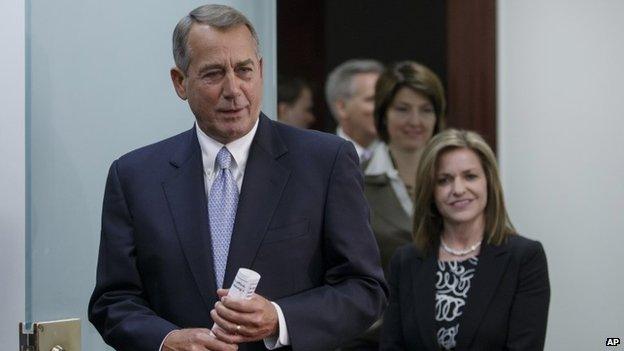House passes increase in US borrowing limit
- Published

Boehner correctly predicted the debt limit rise would need to pass with Democratic votes because few Republicans would support it
The US House of Representatives has passed an increase in the government's debt limit, after the Republicans gave up on their attempt to win concessions from the Democrats in return.
The House voted 221-201 to waive the $17.2tn (£10.4tn) debt limit for just over a year, with only 28 Republicans joining most of the Democrats.
Officials had said the US could breach the debt limit by the end of February.
The White House and others had warned of calamity if the US defaulted.
The bill, when signed into law by President Barack Obama, will enable the US government to borrow money to fund its budget obligations and debt service.
'Obama's debt ceiling'
The US government will run a budget deficit of about $514bn in its 2014 fiscal year.
The Republicans hold a majority in the House, and many had hoped to leverage their ability to block an increase in the government's borrowing limit to win policy concessions from Mr Obama and the Democrats who control the Senate.
In the current and past debt limit fights, the Republican Party's wish-list has included extensive budget cuts, measures that would repeal or undermine Mr Obama's signature healthcare reform, a proposal to force Mr Obama to approve the Keystone XL oil pipeline from Canada, a repeal of recent cuts to pensions for working-age military retirees, and more.
"He will not engage in our long-term spending problem," Republican House Speaker John Boehner told reporters earlier on Tuesday. "So let his party give him the debt ceiling increase that he wants."
As in the last major Washington DC budget brawl, in September and October, Mr Obama and the Democrats said they would refuse to negotiate over the borrowing limit, arguing raising the limit amounted to the US government making good on spending it had already undertaken.
They demanded a "clean" bill that would raise the debt ceiling without enacting additional policy measures.
'A positive step'
The Republican House leadership, often at odds with its restive caucus, floated a plan on Monday that would tie the debt limit increase to restoring a cut in pensions for working-age military retirees that was enacted as a money-saving measure in a recent budget.
But they found they lacked the Republican votes to pass that, as conservative members balked.
A separate vote is planned on that issue. The Senate has already passed a bill to restore the cuts.
The White House welcomed Mr Boehner's decision to hold a vote on a debt limit rise.
"Tonight's vote is a positive step in moving away from the political brinkmanship that's a needless drag on our economy," White House spokesman Jay Carney said in a statement.
Treasury Secretary Jack Lew had estimated the US could use accounting measures to avoid default only until 27 February.
Soon, the US treasury will begin issuing refunds to Americans who overpaid income taxes in 2013, which could strain the government's cash reserves.
- Published12 February 2014
- Published3 October 2013
- Published3 February 2014